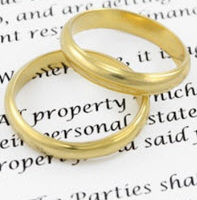What is a Fair and Equitable Property Settlement?

Property settlement negotiations usually play a large part in most divorces and while Florida’s requirement that property agreements be fair and equitable may seem relatively straightforward, this not always true. For instance, most people assume that equitable means equal, but when it comes to property settlements, assets are rarely divided 50/50. For help coming to a fair and equitable property settlement agreement with your own spouse, please contact a property division attorney who can assist you.
Defining Fair and Equitable
Florida courts have not yet provided a specific definition of what it means for a property settlement to be fair and equitable, so what is considered fair and equitable for one couple may look much different than for another couple. There are actually a number of factors that go into determining how a couple’s marital assets are divided, including:
- The age and health status of both parties;
- Each party’s current and future earning potential;
- The standard of living enjoyed during the course of the marriage;
- The value of any non-financial contributions made by each spouse during the marriage;
- The length of the marriage;
- Each spouse’s contribution to the acquisition of an asset; and
- Whether either spouse deliberately wasted assets in an effort to deprive the other party of enjoying them.
While all of these factors do play a role in a court’s determination of what type of property agreement would be fair, it’s important to keep in mind that most courts won’t even need to address these factors if a couple is able to come to an agreement on their own. Generally, courts only intervene if the spouses are unable to reach an agreement in an out-of-court setting, or if it is clear that the agreement that was reached is unfair to one spouse.
When Does This Standard Apply?
It’s also worth noting that, these factors, along with the fair and equitable standard, will only be applied to marital assets, or assets that were acquired by either spouse during the course of the marriage. Separate property, which includes the following types of assets, on the other hand, will remain in the sole possession of the original owner:
- Assets bought or acquired prior to marriage;
- Personal gifts given to one spouse during the marriage;
- Income derived from non-marital assets, unless the funds were relied upon by both parties;
- Any inheritances received by one spouse during the marriage;
- Assets and debts excluded by valid written agreement; and
- Court judgements, settlements, and jury awards recovered during the marriage, but only if the lawsuit was filed in one spouse’s name.
Courts may also take each party’s separate assets into account when determining what would represent a fair and equitable division of marital property in a particular case.
Contact Our Office Today
For help with your own property settlement-related questions and concerns, please call dedicated property division lawyer Sandra Bonfiglio, P.A. in Fort Lauderdale today. You can reach a member of our legal team at 954-945-7591 or via online message.
Resource:
leg.state.fl.us/Statutes/index.cfm?App_mode=Display_Statute&URL=0000-0099/0061/Sections/0061.075.html
